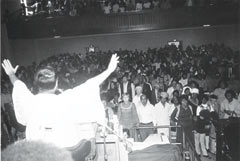Dr. King, Moses and Jesus all shared a mountain top experience, and all of them suggest we may not want to go there. Once you reach the pinnacle, it seems there is a very dangerous downward decline. Dr. King forewarned that while he saw the Promised Land, he did not, in fact, expect to lead his followers into that blessed place. He expected that he would die – that the mountain top offers a vision of a place you may never experience – of a place that is somehow out of reach.
Jim Jones’ ministry is filled with what sounds to me to have been “mountain top” experiences, and like all the others, he came crashing down into periods of doubt, deep depression and uncertainty. But Jones’ long history of impressive successes and the adulation accompanying them did not protect him from the reservations experienced by Moses and Dr. King. Instead, Jones expected to conquer the mountain and lead his people into the Promised Land.
I dare speculate about this because I have found myself on occasion on my way up the mountain – a journey where everything goes exactly right and for which there is no explanation. I might even think that I have been endowed with God-like power and grace, because everything I touch rings of success, truth and power. At the very least I cannot help but think that I am one of God’s chosen, until I discover that I cannot hold my place on the mountain.
Then I find myself plummeting down into a ravine that so tightly restricts my movement, that I think I may as well be dying. In the ravine at the bottom of the mountain, everything is jumbled and in disarray. There is no point in trying to do anything, because as soon as one course of action is identified, another raises its head and steals away any and all available energy. It is misery. I no longer resemble anything that even vaguely approximates a god or one of God’s chosen.
Even though I am not a biblical scholar, I can identify at least two occasions when Jesus was being adored by his followers and in the face of their adulation retreated to isolation in the desert. His successes, especially with healings, and the fact that his disciples identified him as “the Christ” caused him enormous concern. It was too much to handle – too good to be true even for the man who was also the Messiah.
Jesus looked for direction.
I have come to think that we all share some dimensions of this experience. When we are on a high, there is a lack of control that threatens us, and we cannot hold onto our place on the mountain. When we fall into a depression, there is a dread and a touch of nothingness that we experience as a kind of death – a fearsome brush with our mortality. It seems to me to be an experience in which we learn that something in us needs to die, and something in us needs to be born. It seems to suggest to me that if we do not fall to the bottom, we will abuse the gifts that took us to the top and will have missed the meaning in the ascent and descent. It is our brush with resurrection.
When I think of Jonestown – a community blessed with the virgin beauty of terrain untouched by human greed – and hear the voices in Jonestown praising their “heaven on earth,” I cannot help but hope this is the community and Jones the leader who will prove me wrong. But as I wait and listen intently, I begin to hear the screams and the moans of those falling back into the ravine – pushed off the mountain top by some unseen power. They fall into the abyss, and while they recognize that something is wrong, it never dawns on them that they have been recalled to be reborn to contribute something to those struggling to reach new heights.
Who am I to think I am the one to make it right? How can I make it right when I can hardly move? Who do I think I am, when Moses couldn’t make it right, and Jesus couldn’t make it right, and Jim Jones couldn’t make it right?
Our trip to the mountain top is our calling – like Moses’ – captured so powerfully in the command to remove the sandals from our feet and to recognize that we have been called to tread on holy ground and play a special role in moving our people out of slavery and into freedom.
Neither Moses, nor Jim Jones, nor Jesus seemed to have ever satisfied the challenge of preparing disciples to carry on the work. Disciples keep sliding down the mountain, cursing the leader who could only bring them this far. They thirst for the miracle of life on the mountain top and demand ever more from their leader and ever less from themselves.
If I am right, Jim Jones’ downfall was not solely of his own making.
There are leaders who can lift us out of the ravine and carry us high up onto the mountain, but if we reach out while we’re slipping back into the ravine and tear the leader to shreds, we doom the entire movement.
We need to fall into the ravine, and we need to struggle in the misery until we discover what it is that each of us brings to the trek up the mountain that will save our leaders and save our fellow travelers and enable us all to find our way together into the Promised Land.
(Rev. Richard Lawrence is a retired Methodist minister and community activist. His complete collection of writings for the jonestown report may be found here. He may be reached at ralawrence36@gmail.com.)
